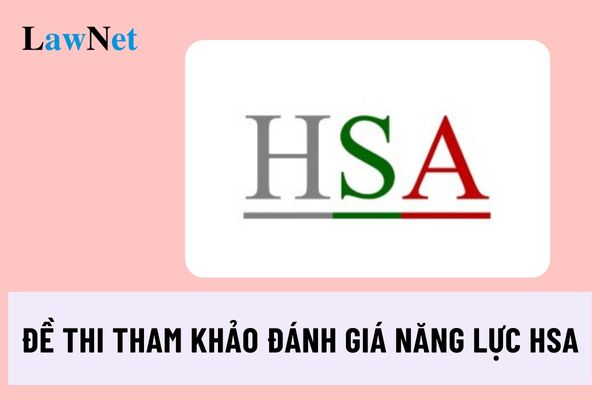Reference Exam for HSA Competency Assessment Test in 2025 in Vietnam
Reference Exam for HSA Competency Assessment Test in 2025 in Vietnam
On August 9, the Testing Center of the Vietnam National University, Hanoi, announced the reference exam paper for the upper secondary school competency assessment test (HSA) for the year 2025.
The reference paper is designed for upper secondary school students following the new upper secondary school program, attending exams organized from 2025 onward.
>> Download View the entire reference exam paper for the 2025 competency assessment exam
To be specific, the structure of the reference exam paper for the 2025 competency assessment exam consists of 50 questions on mathematics and data processing, 50 questions in the field of literature – language. These are the two mandatory sections of the HSA exam.
The third section allows candidates to choose between Science or English. The duration for the third section is 60 minutes. Candidates select 3 out of 5 subjects: physics, chemistry, biology, history, geography; each subject has 17 questions (including 1 experimental question) to complete the Science section.
The English section choice consists of 50 multiple-choice questions designed to serve the admission of foreign language training programs.
Note:
From September 1 onwards, candidates can access the Vietnam National University's website at https://hsa.edu.vn/ to take the test on a computer.

Reference Exam for HSA Competency Assessment Test in 2025 in Vietnam (Image from the Internet)
Content and duration of the new nationwide upper secondary school curriculum in Vietnam
Based on Section 4 of the general education program issued with Circular 32/2018/TT-BGDDT, the content and duration of the new nationwide upper secondary school curriculum are as follows:
- Educational Content
Compulsory subjects and educational activities: literature; mathematics; foreign language 1; history; physical education; national defense and security education; experiential activities, career orientation; local education content.
Elective subjects: geography, economics and law education, physics, chemistry, biology, technology, informatics, music, art.
Students select 4 subjects from the elective subjects.
Learning modules:
Each subject such as literature, mathematics, history, geography, economics and law education, physics, chemistry, biology, technology, informatics, music, art has several learning modules forming a learning module cluster of the subject to meet the requirements of deep specialization, helping students reinforce knowledge and practical skills, to apply learned knowledge and skills to solve real-life issues and meet career orientation needs.
The duration for each learning module is 10 or 15 periods; the total duration for a cluster of learning modules of a subject is 35 periods per academic year. In each grade 10, 11, 12, students select 3 learning module clusters from 3 subjects according to their aspirations and the school's organizational capacity.
Schools can design subject combinations from the aforementioned subjects and learning modules to both meet learners' needs and ensure the suitability with the school's condition regarding the teaching staff, facilities, and teaching equipment.
Optional subjects: ethnic minority language, foreign language 2.
- Educational Duration
Each day consists of one session, with each session having no more than 5 periods; each period lasts 45 minutes.
upper secondary schools meeting the conditions are encouraged to implement teaching in two sessions per day according to the Ministry of Education and Training's guidelines.
Requirements for students' qualities and competencies in the new upper secondary school curriculum in Vietnam
Based on Section 3 of the general education program issued with Circular 32/2018/TT-BGDDT, the general education program, including the new upper secondary school program, forms and develops the following essential qualities for students: patriotism, benevolence, diligence, honesty, responsibility.
It forms and develops the following core competencies for students:
- General competencies formed and developed through all subjects and educational activities: self-control and self-learning capability, communication and cooperation capability, problem-solving and creative capability;
- Particular competencies primarily formed and developed through certain subjects and educational activities: linguistic capability, mathematical capability, scientific capability, technological capability, informational capability, aesthetic capability, physical capability.
In addition to forming and developing core competencies, the general education program also contributes to discovering and nurturing students' talents.

